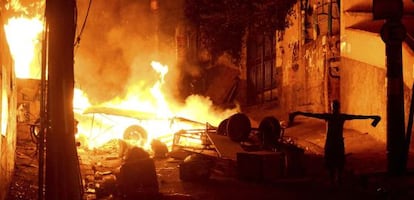Brazil struggles with growing security problem ahead of World Cup kickoff
Violence and unrest on the rise as 'favela' residents complain of police abuses

Despite attempts over the past five years to “pacify” Brazil’s explosive shantytowns, the ongoing violence and social unrest in Rio de Janeiro has reached an explosive point that many government officials now fear will cast a dark shadow over the upcoming Fifa World Cup.
For the past few days, residents of some of the city’s largest favela hilltop communities have been making their voices heard about the discrimination they face and the social inequalities in their country. They have carried out violent protests – setting up fiery barricades and burning public transportation vehicles – over the past few weeks to express their anger over what they claim is the government’s apathy toward the rise in deaths of innocent people who have been caught in the ongoing battles between police and criminals in their communities.
Since Police Pacification Units (UPP) have gone in to occupy the crime-invested communities, drug-trafficking organizations operating out of these favelas have been severely weakened. But, as many analysts point out, major criminal groups have now set up shop on the peripheries of the more strategic favelas where they continue to control drug sales.
The barrage of complaints and reports of alleged abuses committed by law enforcement officers against residents, and the killings of innocent people who have no connections with drug traffickers, are on the rise. The government of Rio state has responded by increasing the police presence in the most troubled communities and issuing more capture and arrest orders for wanted fugitives.
Favela residents have taken advantage of Rio’s global presence as it prepares to host the World Cup
But the Brazilian government finds itself in a delicate situation in dealing with the social unrest. Favela residents – who for years have complained of being treated like second-class citizens – have taken advantage of Rio’s global presence as the city gears up to host the Fifa World Cup and, in two years’ time, the Olympics to break their silence.
They have been buoyed by the massive citizen demonstrations that took place in major cities across the country last year, which erupted by surprise in June with a protest in Rio over public transportation hikes. Now, with the international press starting to arrive for June’s World Cup, the favela residents have begun to drum up attention of their own.
The most ferocious protests occurred on Tuesday when a large group of residents from the Pavão-Pavãozinho favela set up road blockades and burned buses in the city’s famous Copacabana neighborhood. Guests at some hotels were told not to go out on the streets while local shops were forced to close. Police used helicopters to try to control the protestors and gunfire rang out in some streets where officers clashed with demonstrators.
With less than two months to go before the World Cup kicks off, Rio and Brazilian officials were taken aback by the images of Tuesday’s protest in Copacabana, which were viewed around the world and evoked more doubt over whether Brazil is capable of providing adequate security at the two upcoming international events.
By nightfall, at least one person was confirmed dead in the Copacabana clash: a 30-year-old man, who was shot in the head. The residents of Pavão-Pavãozinho favela, which is located just blocks away from the tourist sector, were outraged over the death of a 25-year-old dancer, Douglas Rafael da Silva Pereira, who lived in the favela.
Brazilian officials were taken aback by the images of the protest in Copacabana, which were seen worldwide
Da Silva’s body was found in a nursery and he appeared to have been tortured and beaten to death by law enforcement officers, according to his mother. An autopsy report showed that he died from internal hemorrhaging near his lungs, which had been caused by a beating.
Similar violence has also erupted in other Rio favelas such as Rocinha, which is sandwiched between the affluent neighborhoods of Leblon and São Conrado, following the reported killing of an innocent resident.
“It has become the modus operandi to destroy everything in sight after police officers kill someone,” said Jorge Luis Marconi, who is a regular visitor to Copacabana.
Ignacio Cano, a sociologist who specializes in public security, said the government would not make any important decisions or changes in strategy until after the elections this year.
“It clear that the UPP has a crisis on its hands – crime is rising and all the inroads made over the years by this force are hanging in jeopardy,” he said.
Tu suscripción se está usando en otro dispositivo
¿Quieres añadir otro usuario a tu suscripción?
Si continúas leyendo en este dispositivo, no se podrá leer en el otro.
FlechaTu suscripción se está usando en otro dispositivo y solo puedes acceder a EL PAÍS desde un dispositivo a la vez.
Si quieres compartir tu cuenta, cambia tu suscripción a la modalidad Premium, así podrás añadir otro usuario. Cada uno accederá con su propia cuenta de email, lo que os permitirá personalizar vuestra experiencia en EL PAÍS.
¿Tienes una suscripción de empresa? Accede aquí para contratar más cuentas.
En el caso de no saber quién está usando tu cuenta, te recomendamos cambiar tu contraseña aquí.
Si decides continuar compartiendo tu cuenta, este mensaje se mostrará en tu dispositivo y en el de la otra persona que está usando tu cuenta de forma indefinida, afectando a tu experiencia de lectura. Puedes consultar aquí los términos y condiciones de la suscripción digital.








































